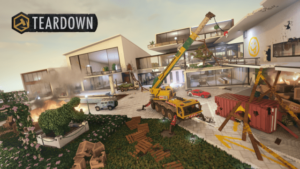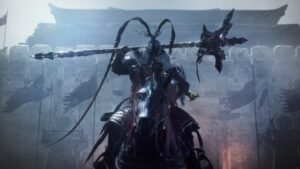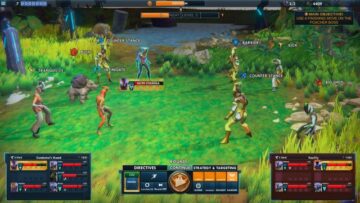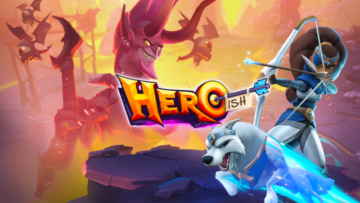Some of the very first movies were, in some ways, documentaries. The Lumiere Brothers’ “L’Arrivée d’un train en gare de La Ciotat”, for instance, still lives on in film classes around the world. However, in a medium as inspired by the cinematic art form as games, it’s a surprising rarity to see interactive documentaries. This makes it all the more fitting that the first in Digital Eclipse’s Gold Master series would be about Karateka, one of the first real cases of cinematic influence on the medium of games.
Now that I’ve had a paragraph to get my film student “geek out” out of my system, I’d like to discuss, in earnest, why The Making of Karateka is truly special.
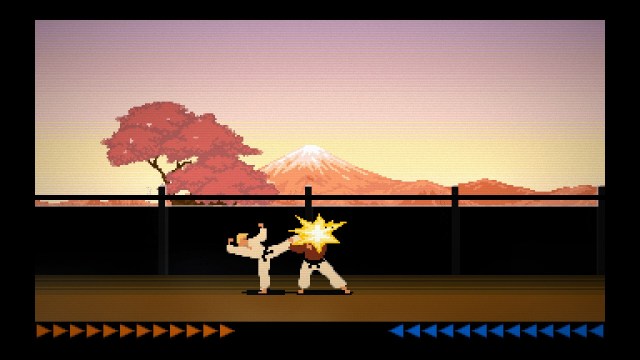

Fresh off of Atari 50, a collection that I now know I have to play as soon as possible, Digital Eclipse teamed with the legendary game developer Jordan Mechner to lay out a timeline of the development of his game, Karateka. However, far from satisfied with simply remastering the title, making a behind-the-scenes documentary, or collecting a bunch of old prototypes and preserving them, Digital Eclipse opted to do all three. The end result is an interactive documentary like no other.
The Making of Karateka tells, in five chapters, the story of the legendary Jordan Mechner. If that name doesn’t sound familiar, it should. Mechner is responsible for, among other titles, the Prince of Persia series. Through a collection of behind-the-scenes videos, archival footage, interviews with Mechner, his father and several industry peers (including id Software royalty and Kinda Funny X-Cast’s own Gary Whitta), prototypes and virtual exhibits, you get to follow Mechner from his early days skipping classes and working on clones of Asteroids, to, with the help of family and friends, changing the course of the industry forever.
The behind-the-scenes videos are very strong. Intimate, energetic and informative, they paint a strong picture of why Karateka is an important title for the history of the games industry. While the image quality does at times border on “zoom webcam”, the videos are slickly edited and above all, just incredibly entertaining to watch.
The virtual exhibits are also a joy to go through. From journals of Mechner’s, to early correspondence between the developer and his publisher and even a variety of old advertisements and box art, you get to explore every facet of Karateka in an unparalleled level of depth. Deep dives into the process of rotoscoping (an animation technique), focus test results, box and manual copy revisions, podcast breakdowns of the influence of classic music on the score and much more! Truly, no stone goes unturned in painting a complete picture of Karateka.
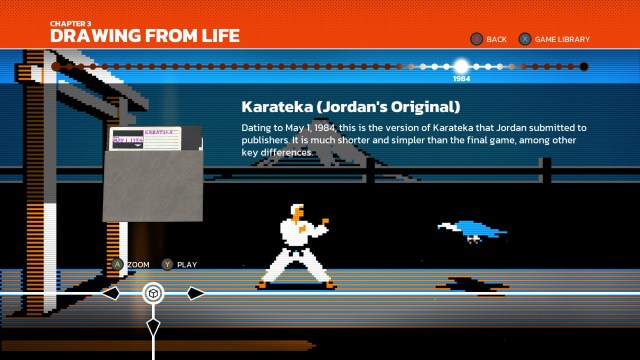

Of course, a picture is worth a thousand words, but in this case, an actual game is worth a million. Thankfully, The Making of Karateka does not disappoint here. Throughout the game, you will have access to several never-before-released prototypes of Karateka and Mechner’s earlier games. A variety of platforms are emulated and you can play these games, from start to finish, with little features like rewinding added to an otherwise untouched title. The games are, of course, a little archaic by modern sensibilities, but rather than hide from this, the team at Digital Eclipse chooses to embrace it in a really special way.
Included in this package are two remasters. One for one of Mechner’s earlier titles (I’m being purposefully vague) and one for Karateka. These remasters overhaul the titles in terms of graphics and control but retain the heart and spirit of the original games. They even restore content that was cut from earlier versions. Without question, these remasters are the definitive way to play these titles and feel like a museum curator carefully restored them.
With all of this being said, there are a few disappointing aspects to The Making of Karateka. Firstly, the lack of alt-text makes some images and exhibits difficult to read. With all due respect to Mechner and his peers, their handwriting isn’t always the easiest to read. Additionally, the controls in the legacy titles are not exactly the smoothest, likely a result of porting over to console (the controls in the remasters, comparatively, are superb).
Finally, to briefly touch upon value, The Making of Karateka retails for a price of around $20 USD/£16.74 or equivalent. Given the amount of value on offer here, I am inclined to call this a steal. If you care about how the games of today came to be, the price is well worth it.
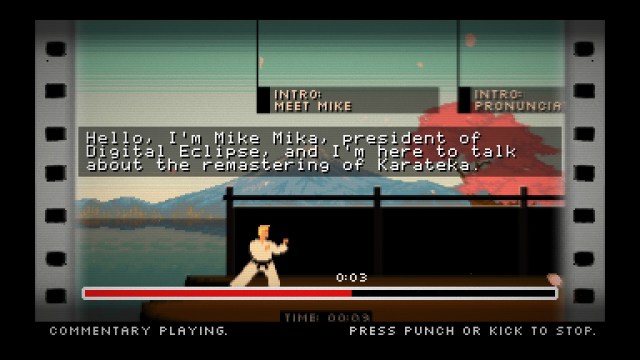

Really, that describes the whole game. Anyone who cares about the rich history of games as an art form needs to play The Making of Karateka. While I’m not unaware that these next few months are quite busy, this is a five-hour journey with decades’ worth of impactful stories baked into it.
Digital Eclipse is pioneering a new wave of interactive documentaries much in the way Karateka brought cinematic influence to games, and I frankly cannot wait to see what title shows up next in the Gold Master series. It’s made one hell of a good first impression.
- SEO Powered Content & PR Distribution. Get Amplified Today.
- PlatoData.Network Vertical Generative Ai. Empower Yourself. Access Here.
- PlatoAiStream. Web3 Intelligence. Knowledge Amplified. Access Here.
- PlatoESG. Automotive / EVs, Carbon, CleanTech, Energy, Environment, Solar, Waste Management. Access Here.
- PlatoHealth. Biotech and Clinical Trials Intelligence. Access Here.
- ChartPrime. Elevate your Trading Game with ChartPrime. Access Here.
- BlockOffsets. Modernizing Environmental Offset Ownership. Access Here.
- Source: https://www.thexboxhub.com/the-making-of-karateka-review/
- :is
- :not
- $UP
- 1
- a
- About
- above
- access
- actual
- added
- Additionally
- AI
- All
- also
- always
- am
- among
- amount
- an
- and
- animation
- anyone
- archaic
- ARE
- around
- Art
- AS
- aspects
- At
- BE
- behind the scenes
- being
- between
- border
- Box
- briefly
- brought
- Bunch
- busy
- but
- by
- call
- came
- CAN
- cannot
- care
- carefully
- case
- cases
- changing
- cinematic
- classes
- classic
- Collecting
- collection
- comparatively
- complete
- Console
- content
- control
- controls
- course
- Cut
- Days
- deep
- definitive
- depth
- Developer
- Development
- difficult
- digital
- disappointing
- discuss
- do
- documentaries
- documentary
- does
- Doesn’t
- due
- Earlier
- Early
- easiest
- embrace
- end
- entertaining
- Equivalent
- Even
- Every
- exactly
- exhibits
- explore
- familiar
- family
- far
- Features
- feel
- few
- Film
- finish
- First
- fitting
- five
- Focus
- follow
- For
- forever
- form
- friends
- from
- funny
- game
- Games
- games industry
- Gary
- get
- given
- Go
- Goes
- Gold
- good
- graphics
- had
- Have
- Heart
- help
- here
- Hide
- High
- his
- history
- How
- However
- HTTPS
- i
- ID
- if
- image
- images
- impactful
- important
- in
- Inclined
- Including
- incredibly
- industry
- influence
- informative
- inspired
- instance
- interactive
- Interviews
- intimate
- into
- IT
- Jordan
- journey
- jpg
- just
- Know
- Lack
- lay
- Legacy
- legendary
- Level
- like
- likely
- little
- Lives
- made
- MAKES
- Making
- manual
- master
- max-width
- medium
- million
- Modern
- months
- more
- Movies
- much
- Museum
- Music
- my
- name
- needs
- New
- next
- no
- now
- of
- off
- offer
- Old
- on
- ONE
- or
- original
- Other
- otherwise
- out
- over
- Overhaul
- own
- package
- paint
- painting
- peers
- picture
- Pioneering
- Platforms
- plato
- Plato Data Intelligence
- PlatoData
- Play
- podcast
- possible
- preserving
- price
- process
- prototypes
- publisher
- quality
- question
- rarity
- rather
- Read
- real
- really
- respect
- responsible
- restore
- restored
- result
- Results
- retain
- review
- revisions
- Rich
- royalty
- Said
- satisfied
- satisfied with
- score
- see
- sensibilities
- Series
- several
- should
- Shows
- simply
- Software
- some
- Soon
- Sound
- special
- spirit
- start
- Still
- STONE
- Stories
- Story
- strong
- Student
- surprising
- system
- team
- teamed
- tells
- terms
- test
- than
- that
- The
- the world
- their
- Them
- There.
- These
- they
- this
- three
- Through
- throughout
- timeline
- times
- Title
- titles
- to
- today
- touch
- Train
- truly
- two
- unparalleled
- upon
- value
- variety
- very
- Videos
- Virtual
- wait
- was
- Watch
- Wave
- Way..
- ways
- WELL
- were
- What
- while
- WHO
- whole
- why
- will
- with
- without
- words
- working
- world
- worth
- would
- you
- zephyrnet



